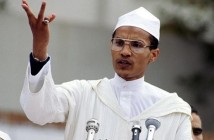On July 11, the German Marshall Fund’s Washington DC office hosted a conversation on political reform in Morocco in Washington DC, which focused primarily on the new Moroccan Constitution – as recently approved by popular referendum on July 1 2011. The discussion was moderated by S. Enders Wimbush, GMF Senior Director for Foreign Policy & Civil Society, who was joined by Driss El Yazimi,President, National Human Rights Council and Member of the Moroccan Constitutional Reform Council; Leila Hanafi, Staff Attorney and Programs Manager, The World Justice Project; and David Kramer, President, Freedom House.
The conversation started with panelists reflecting on the Arab Spring and debating how Morocco fits into the new regional context. El Yazimi started by pointing out that while the Arab Spring highlights issues that are common to all Arab states, it also involves dynamics that are best understood from a national perspective. As with other countries in its region, in Morocco the Arab Spring is primarily about the emergence of a new youth voice, the growing visibility and role of women in public space, and the increased engagement of ordinary people in the process of economic and political reform. Among the distinctive elements specific to Morocco’s path to change, El Yazimi highlighted the fact that Morocco features a historically strong monarchy which enjoys strong public legitimacy; that Morocco has for a long time cultivated a culture of pluralism; and that the process of reform started in the country well before the advent of the Arab Spring in 2011. El Yazimi added that for Morocco, the Arab Spring is an opportunity to step up a process of change that was already ongoing and something that it can use to find new partners to promote greater democratization of the region.
Leila Hanafi and David Kramer both welcomed the recent reforms as an important step for Morocco, but focused their comments on the challenges that Rabat still faces as it begins to implement its reforms. In particular, there was broad consensus that the process of reform might not yield the desired results if the action of the King is not matched by a sustained and bottom-up involvement of Moroccan society, starting with youth organizations and NGOs. Kramer also insisted that freedom of the press is still not assured in Morocco, but will be critical for the reform process to move forward. During the question and answer session, participants asked about the role that the so-called ‘February 20 movement’ will play in the aftermath of the referendum which it called to boycott; the challenges that Morocco’s parties will face in traversing the new political environment; the counter forces that Moroccan reformers may find on their way towards democratization; the impact that reforms may have on neighboring countries; and the role that Morocco’s partners in the region and in the West may have in supporting change.
The conversation ended with the panelists agreeing that it is too early to conclude what the outcome of recent reforms will be, but that the foundations for a process of real change have been put in place through the approval of the new Constitution.






